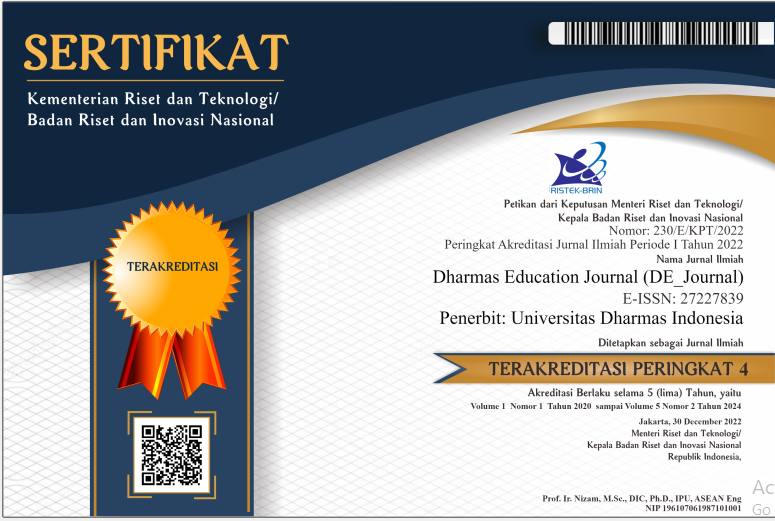PENGARUH PENGGUNAAN MODEL PEMBELAJARAN WORD SQUARE TERHADAP HASIL BELAJAR IPS SISWA KELAS VI SDN 08 SITIUNG
DOI:
https://doi.org/10.56667/dejournal.v1i2.96Keywords:
Eksperimen, Word Square, Hasil BelajarAbstract
The model used in study a Quasi Experimental Design model, the design used the Nonequivalent Control Group Design, there are two groups selected, then given pretest to determine initial state whether there a difference between the experimental group and control group. Student learning outcomes in social studies subjects class VI A and B SDN 08 Sitiung have fulfilled the KKM. because students feel that social studies learning is much material and requires students notes and memorize the material lot, social studies learning from understanding concepts, the lack of application learning models during the learning process.
Results showed there effect of application learning with word square model social studies learning outcomes of class VI students. The average value experimental class learning outcomes higher than control class. comparison the mean value the experimental class and control class 81.05> 71.75, Sig. 2-tailed to t-test 0.009 <0.05 which shows Ho rejected, there a significant difference experimental class and control class. Conclusion learning woqrd square model have influence the social studies learning outcomes class VI SDN 08 Sitiung. social studies score students before word square model was low, after being given the word square model there was an increase in student social studies learning outcomes
Downloads
References
Fuadah, A. (2015). Keefektifan model word square dalam pembelajaran ips materi uang tema permainan pada siswa kelas III SD N 1 pepedan purbalingga. purbalingga: universitas negeri semarang.
Jakni. (2016). Metodologi Penelitian Eksperimen Bidang Pendidikan. bandung: Alfabeta.
Khuluqo, I. E. (2017). Belajar dan Pembelajaran. yogyakarta: pustaka pelajar.
Kurniansih, i. d. (2015). pengembangan model pembelajaran. jakarta: kata pena.
Lestari, T. d. (2012). pengaruh model pembelajaran word square terhadap pembelajaran ips kelas IPS III SD. singaraja: universitas pendidikan ganesa.
Sisdiknas. (2003). UU sistem pendidikan nasional. jakarta: 8 juli 2003.
sugiyono. (2016). metode penelitian kuantitatif, kualitatif, dan kombinasi (mixed methods). bandung : alfabeta.
susanto, A. (2013). Teori belajar dan pembelajaran di sekolah dasar. jakarta: kencana.
Wahyuni, E. (2013). Peran keluarga dalam pencapaian pendidikan. cakrawala pendidikan, 15(1), 10-16.
Downloads
Published
How to Cite
Issue
Section
License
Copyright (c) 2020 DE_JOURNAL (Dharmas Education Journal)

This work is licensed under a Creative Commons Attribution-NonCommercial-NoDerivatives 4.0 International License.
Makalah yang disampaikan diasumsikan tidak mengandung bahan propietary yang tidak dilindungi oleh hak paten















